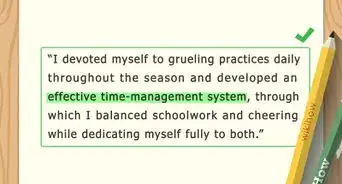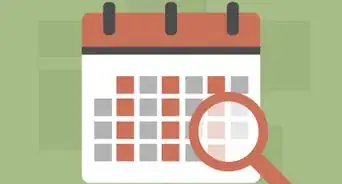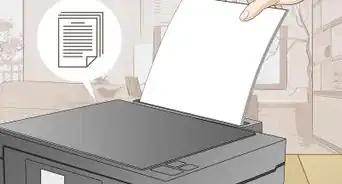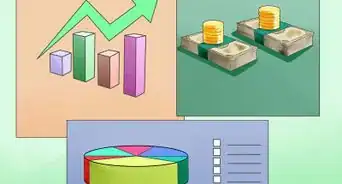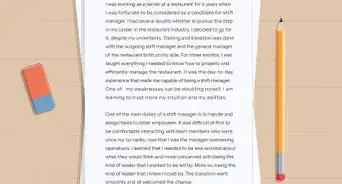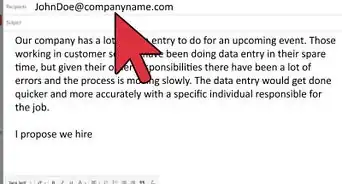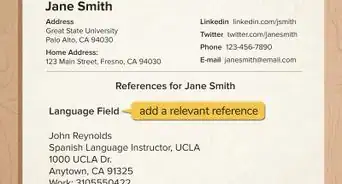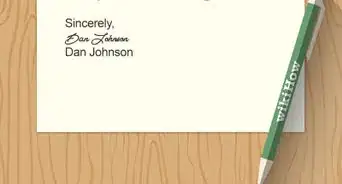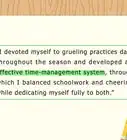This article was co-authored by Brandy DeOrnellas, PCC, ESQ. and by wikiHow staff writer, Madeleine Flamiano. Brandy DeOrnellas is a Professional Certified Coach specializing in life and career aspirations and transitions. She also serves company founders and small business owners. She is a former attorney with more than three years of experience as a coach. Brandy holds a JD from Harvard Law School. She also holds a BA in Social Welfare and a BA in Political Science from The University of California, Berkeley. In addition to her formal education, she has multiple coaching certifications, including a Professional Coaching Certification from The University of California, Davis, and a Relationship Coach Certification from Prepare/Enrich. She is a Professional Certified Coach (PCC) with the International Coaching Federation.
There are 15 references cited in this article, which can be found at the bottom of the page.
This article has been viewed 8,763,322 times.
A company you want to apply to has asked you to send in a CV and you're thinking, "Wait...what is that?" Don't worry! Curriculum Vitae (CV) means "course of life" in Latin, and that's a really accurate description. Basically, a CV is a handy and impressive document that summarizes your past education as well as your professional skills, proficiencies, and experiences. Here, we'll go through each and every part of a CV so yours is perfectly formatted. We'll even throw in an example of a full CV for you to review. So, if you're ready to win over recruiters and employers with all you've accomplished over the years, read on—you'll be able to really "sell" yourself and share your whole story with a stellar CV!
Things You Should Know
- Tailor your CV to your ideal role—review the job posting for specific requirements and include the most relevant past jobs, skills, interests, or hobbies you have.
- Start your CV with a short description of yourself—known as an Objective or Summary—so employers get a "snapshot" of what you offer as a candidate.
- If you've just recently graduated from a program, then fill your "Work Experience" section with roles you took on while you were a student, like internships.
- Use standard formatting for your CV so it's easy for recruiters and employers to skim over. Also include keywords that a company's hiring software might search for.
Steps
Template for a CV
Proper Order of Sections
-
1Include a header with your contact information. At the very top of your CV, share your full name, address, phone number, email address, and LinkedIn profile. While employers don’t need to know your street address, it’s important for them to know where you’re based—for example, you might need to work in the same time zone or be familiar with where their operations take place. The rest of your contact information allows them to follow up about the position you applied for.[1]
- Harper Madison
Los Angeles, California
(424) 555-6000
hmadison@alumni.ucla.edu
linkedin.com/in/harper-madison
- Harper Madison
-
2Create a CV Objective or CV Summary. Craft a short paragraph that’s 100 words or less. Tell recruiters and employers why you’re the best candidate for the role. If you have less work experience, use a CV Objective to discuss your knowledge and skills. On the other hand, if you have a strong background in your chosen field, stick to a CV Summary to expand on what you’ve accomplished.[2]
- A recent college grad with an MFA (Master in Fine Arts):
Independent and dynamic writer with a Master of Fine Arts in Film & Television offers a wealth of knowledge about cinematography and the craft of thought provoking documentaries. Seeking to join National Geographic to curate and create exceptional content that educates a global audience. - A seasoned professional with 11 years of experience as a magazine editor:
Accomplished Magazine Editor with over 10 years of experience overseeing and managing content for premier publications with an international readership. Knowledgeable about selecting feature stories that are timely and fresh. Brings a repertoire of refined writing skills and a keen passion for quality journalism. Adept at guiding writers to produce compelling and noteworthy pieces.
Advertisement - A recent college grad with an MFA (Master in Fine Arts):
-
3Share your work experience. Read the job description and include information about your work experience that’s relevant to the position. For example, if you wish to work for an engineering firm, mention your responsibilities as a lab tech. Use action verbs (like “researched” and “implemented”) and be sure to include achievements (such as “streamlined laboratory procedures by 35%").[3]
-
Graduate Student
UCLA — May 2019 - August 2022
Cast, directed, and produced various film and television projects. Planned, organized, and budgeted documentary shorts and films with Celtx. Edited documentaries using Black Magic DaVinci Resolve. Performed sound editing with Sound Forge. Conducted interviews, curated archival footage, and wrote scripts.
• Directed and produced documentary shorts and films
• Budgeted, planned, and organized film shoots
• Scouted and secured filming locations
• Communicated with all participants cited in documentaries
• Produced The Last Laugh: Female Comedians Bite Back, a project that was showcased at the DOC LA Film Festival
-
Graduate Student
-
4Give an overview of your education. List your graduation year—if you're still working on your program, use your expected graduation date—your degree, the name of your institution, and any honors you earned. If you have little to no work experience, place your "Education" section above your "Work Experience" section and go into more detail about your academics.[4]
- If you just graduated, you might want to include:
- The title of your dissertation
- Your favorite fields of study
- Coursework that's relevant to the job you want
- Your key achievements
- Your extracurricular activities
Education
Degrees:
Master of Fine Arts (MFA) in Film and Television (2022)
University of Southern California, Los Angeles, California
Bachelor of Arts in Film & Media (2018)
University of California, Berkeley, California
Dissertation:
"Strange Encounters in the Eastside: Urban Unrest in Los Angeles"
International Study:
University of Belgrano, Buenos Aires, Argentina (Summer 2019)
Latin American Cinema, Human Rights and Cultural Representation
Honors and Scholarships:
Charles F. Scott Fellowship ($15,000)
Marilyn Yarbrough Dissertation Award ($36,000)
Coursework of Interest:
Documentary Research Methodologies
Feature Film Writing
Extracurriculars:
Vice President of The Film & Photography Society at UCLA
Mentor for the Youth Cinema Project
- If you just graduated, you might want to include:
-
5Mention any special skills of yours. If you already have work experience, showcase how you've honed your abilities in your industry—share industry awards, professional certifications, professional affiliations, conferences you've attended, or additional training you have under your belt. If you're a recent graduate or still studying, mention your hobbies and interests, projects you've involved in, and freelance work you do on the side.[5]
- A seasoned professional with 11 years of experience as a magazine editor:
Certificates
Certified Journalism Educator (CJE)
Certified Advertising Specialist (CAS)
Industry Awards
Editorial Director of the Year, Editor-in-Chief for Artful Living
Conferences
The American Copy Editors Society (ACES) – 2022, 2018, 2017
Memberships
American Copy Editors Society (ACES)
American Society of Magazine Editors (ASME) - A recent college grad with an MFA (Master in Fine Arts):
Activities and Interests
Fluent in Spanish and Portuguese
Volunteers weekly at Home Again L.A.
Member of the LA Film Society
Freelances for Filmless
Runs a personal blog, The Doc is in the House
- A seasoned professional with 11 years of experience as a magazine editor:
-
6End with additional sections, like “Awards” or “Publications.” End your CV with a final flourish that shows employers your stellar mind and level of discipline. Include any awards that you received outside of academia or your professional roles as well as any articles, journals, or works you've published.[6]
-
Awards
Best First Film, Audience Favorite (DOC LA)
Best of Show, Humanitarian Award (IndieFEST Film Awards)
Publications
"Breaking the Bystander Effect: How a Viral Documentary Inspired Action." Los Angeles Magazine, 8 August 2022.
-
Awards
Expert Q&A
-
QuestionHow do I write a CV for my first job?
 Brandy DeOrnellas, PCC, ESQ.Brandy DeOrnellas is a Professional Certified Coach specializing in life and career aspirations and transitions. She also serves company founders and small business owners. She is a former attorney with more than three years of experience as a coach. Brandy holds a JD from Harvard Law School. She also holds a BA in Social Welfare and a BA in Political Science from The University of California, Berkeley. In addition to her formal education, she has multiple coaching certifications, including a Professional Coaching Certification from The University of California, Davis, and a Relationship Coach Certification from Prepare/Enrich. She is a Professional Certified Coach (PCC) with the International Coaching Federation.
Brandy DeOrnellas, PCC, ESQ.Brandy DeOrnellas is a Professional Certified Coach specializing in life and career aspirations and transitions. She also serves company founders and small business owners. She is a former attorney with more than three years of experience as a coach. Brandy holds a JD from Harvard Law School. She also holds a BA in Social Welfare and a BA in Political Science from The University of California, Berkeley. In addition to her formal education, she has multiple coaching certifications, including a Professional Coaching Certification from The University of California, Davis, and a Relationship Coach Certification from Prepare/Enrich. She is a Professional Certified Coach (PCC) with the International Coaching Federation.
Career & Life Transition Coach Most companies now use software that ranks and sorts resumes based on how well matched the applicant is for the job. Ensure that your resume includes all relevant keywords and requirements from the job description. Then, try to also make your resume user-friendly for a human audience.
Most companies now use software that ranks and sorts resumes based on how well matched the applicant is for the job. Ensure that your resume includes all relevant keywords and requirements from the job description. Then, try to also make your resume user-friendly for a human audience. -
QuestionWhat’s the best format for a CV?
 wikiHow Staff EditorThis answer was written by one of our trained team of researchers who validated it for accuracy and comprehensiveness.
wikiHow Staff EditorThis answer was written by one of our trained team of researchers who validated it for accuracy and comprehensiveness.
Staff Answer wikiHow Staff EditorStaff AnswerThere’s no set format for a CV, but you should choose something that looks professional and well-organized. If you’re not sure where to start, look for CV templates online or use a built-in template that comes with your word processing program. The job or program you’re applying for may also have specific requirements for the CV format.
wikiHow Staff EditorStaff AnswerThere’s no set format for a CV, but you should choose something that looks professional and well-organized. If you’re not sure where to start, look for CV templates online or use a built-in template that comes with your word processing program. The job or program you’re applying for may also have specific requirements for the CV format. -
QuestionHow do you write a student CV?
 wikiHow Staff EditorThis answer was written by one of our trained team of researchers who validated it for accuracy and comprehensiveness.
wikiHow Staff EditorThis answer was written by one of our trained team of researchers who validated it for accuracy and comprehensiveness.
Staff Answer wikiHow Staff EditorStaff AnswerIf you’re a student, you may not have a lot of job experience to put on your CV yet. However, make sure to include any work experience you’ve had, even part-time work-study gigs, and focus on the skills that you developed doing those jobs. You can also emphasize your educational background and any applicable skills you’ve picked up from your coursework. Extracurricular activities can also make you look more attractive to employers, so include things like your time spent in debate club or working on the student newspaper.
wikiHow Staff EditorStaff AnswerIf you’re a student, you may not have a lot of job experience to put on your CV yet. However, make sure to include any work experience you’ve had, even part-time work-study gigs, and focus on the skills that you developed doing those jobs. You can also emphasize your educational background and any applicable skills you’ve picked up from your coursework. Extracurricular activities can also make you look more attractive to employers, so include things like your time spent in debate club or working on the student newspaper.
References
- ↑ https://careers.ucsc.edu/student/resources/resume_cover_letters/Curriculum%20Vitae.html
- ↑ https://online.wharton.upenn.edu/blog/how-to-write-a-career-change-resume/
- ↑ https://gradschool.cornell.edu/career-and-professional-development/pathways-to-success/prepare-for-your-career/take-action/resumes-and-cvs/
- ↑ https://education.indiana.edu/students/careers/docs/CV%20Guide.pdf
- ↑ https://grad.ucla.edu/asis/agep/advcv.pdf
- ↑ https://www.fullerton.edu/career/students/resumes-cover-letters/curriculum-vitae.php
- ↑ https://help.open.ac.uk/types-of-cvs
- ↑ https://online.wharton.upenn.edu/blog/how-to-write-a-career-change-resume/
- ↑ https://icc.ucdavis.edu/materials/resume/cv/convertingcv
- ↑ https://careerservices.uic.edu/students/resumes-cvs-cover-letters/
- ↑ https://postdocs.nd.edu/assets/146643/tips_formatting_academic_cv.pdf
- ↑ https://careercenter.georgetown.edu/major-career-guides/resumes-cover-letters/curriculum-vitae-cv/
- ↑ https://postdocs.nd.edu/assets/146643/tips_formatting_academic_cv.pdf
- ↑ https://cdn1.sph.harvard.edu/wp-content/uploads/sites/36/2016/06/Resume-Guide-June-2016.pdf
- ↑ https://www.training.nih.gov/assets/Guide_to_Resumes_and_Curricula_Vitae.pdf
- ↑ https://www.wellesley.edu/careereducation/resources/cv-curriculum-vitae-guidelines
- ↑ https://www.britannica.com/story/whats-the-difference-between-a-rsum-and-a-cv
About This Article
To write a CV, include your name, address, and contact information at the top, as well as a 1-sentence personal summary that says something like "Enthusiastic and adaptable recent graduate looking for an editorial position." Then, include education and work-experience sections that are in reverse chronological order. You should also create a skills section that lists any relevant skills you have. Finish your CV with a references section with contact information for your previous employers. To learn how to format your CV, read the article!

-Step-1-Version-4.webp)
-Step-2-Version-4.webp)
-Step-3-Version-4.webp)
-Step-4-Version-4.webp)
-Step-5-Version-4.webp)
-Step-6-Version-4.webp)
-Step-7-Version-4.webp)
-Step-8-Version-4.webp)
-Step-9-Version-4.webp)
-Step-10-Version-4.webp)
-Step-11-Version-4.webp)
-Step-12-Version-4.webp)
-Step-13-Version-4.webp)
-Step-14-Version-4.webp)
-Step-15-Version-3.webp)
-Step-16-Version-4.webp)
-Step-17-Version-3.webp)
